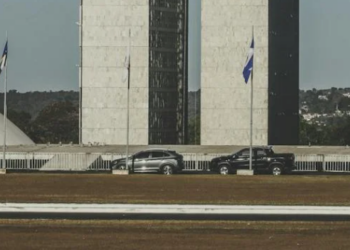by PublicABCP
Translated and reviewed by Matheus Lucas Hebling
In the first quarter of 2023, Lua Nova: Revista de Cultura e Política published the article “As Paisagens de Morte e a Covid-19 nas Américas: As Respostas Normativas da Comissão Interamericana de Direitos Humanos em Torno da Vulnerabilidade-Morte.”
Authored by Claudia Marconi, Rafael de Souza Nascimento Miranda, and Isabela Agostinelli dos Santos, the article examines the responses of Brazil and the United States to the Covid-19 pandemic, while also analyzing the role of the Inter-American Commission on Human Rights (IACHR) in addressing vulnerability and death during the crisis. The IACHR, an intergovernmental body tasked with promoting and protecting human rights in the Americas, is critically evaluated as part of this investigation.
The study revisits the Covid-19 figures from March 2021, one year into the pandemic. At that point, Brazil had surpassed 300,000 deaths, second only to the United States, which had recorded more than 549,000 deaths. Together, these two countries accounted for nearly 30% of all Covid-19 deaths globally at the time.
According to the authors, the populations hit hardest by the pandemic in Brazil were Indigenous peoples, quilombolas, Black Brazilians, and economically marginalized communities—both in rural areas and major urban centers. The article argues that containment measures, such as lockdowns and social isolation, were designed for a specific, privileged segment of society whose vulnerability had already been mitigated by the state.
One stark example is remote work, which, as the article highlights, excluded the majority who relied on overcrowded and underfunded public transportation systems for daily survival. Such measures could only be accessed by a narrow slice of society.
A similar pattern emerged in the United States. Structural inequality—marked by race, gender, poverty, food insecurity, inadequate housing, lack of sanitation, and discrimination in access to public services—transformed vulnerability into a near-constant tragedy and death into a normalized, unmediated outcome.
Citing the work of Felipe Milanez and Samuel Vida (“Pandemia, racismo e genocídio indígena e negro no Brasil: coronavírus e a política da morte”), the authors stress that tragedies unfold unequally across society, revealing long-standing structural inequalities—especially in exposure to risk and the construction of vulnerability. “People are ‘left to die’ in the face of austerity policies that have dismantled public services, particularly healthcare.”
By mapping these “landscapes of death” in the two largest democracies in the Americas, and introducing the conceptual framework they call the “vulnerability-death binomial,” the authors seek to examine how the humanitarian and health crisis triggered by Covid-19 could represent a turning point in how vulnerability and death are addressed within the region’s institutional political structures—especially regarding the normative responses of the Inter-American Commission on Human Rights.
The article argues that “a strengthened international political vocabulary for vulnerability is intrinsically linked to the recognition of death, just as a strengthened vocabulary for death is inextricably tied to an ontological and contextual recognition of vulnerability.”
The authors conclude that “to produce a theoretical zone of inclusion for death within political discourse and democratic politics is an ethical imperative—especially in the face of the severe injustices outlined in this study.”
Read the full article: https://doi.org/10.1590/0102-167194/118
About the Authors
Claudia Marconi is a professor of International Relations and the Professional Master’s Program in Global Governance and International Policy Formulation at the Pontifical Catholic University of São Paulo (PUC-SP). She also teaches undergraduate International Relations at Fundação Escola de Comércio Álvares Penteado and holds the Jean Monnet Chair in European Studies.
Rafael de Souza Nascimento Miranda is a Ph.D. candidate in Political Science at the University of São Paulo (USP). He holds a Master’s in International Relations from USP’s Institute of International Relations (IRI) and is Executive Coordinator of Jean Monnet Projects at Fundação Escola de Comércio Álvares Penteado.
Isabela Agostinelli dos Santos is a Ph.D. candidate in the San Tiago Dantas Graduate Program in International Relations (a joint program by Unesp, Unicamp, and PUC-SP). She holds a BA in International Relations from PUC-SP and is a member of the International Conflict Studies Group (GECI) at PUC-SP.








